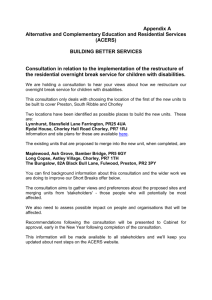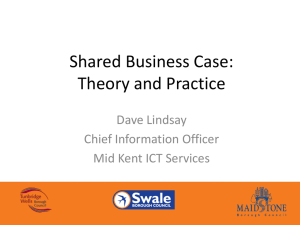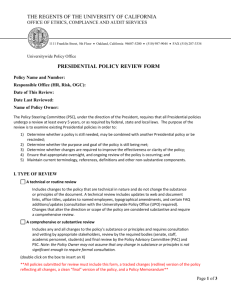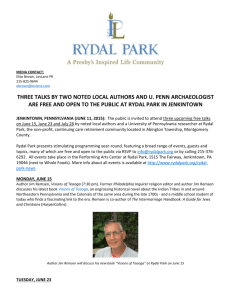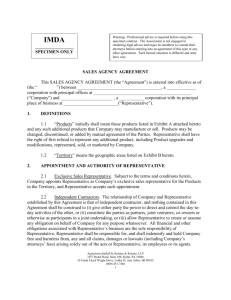View as DOCX (5) 61 KB
advertisement
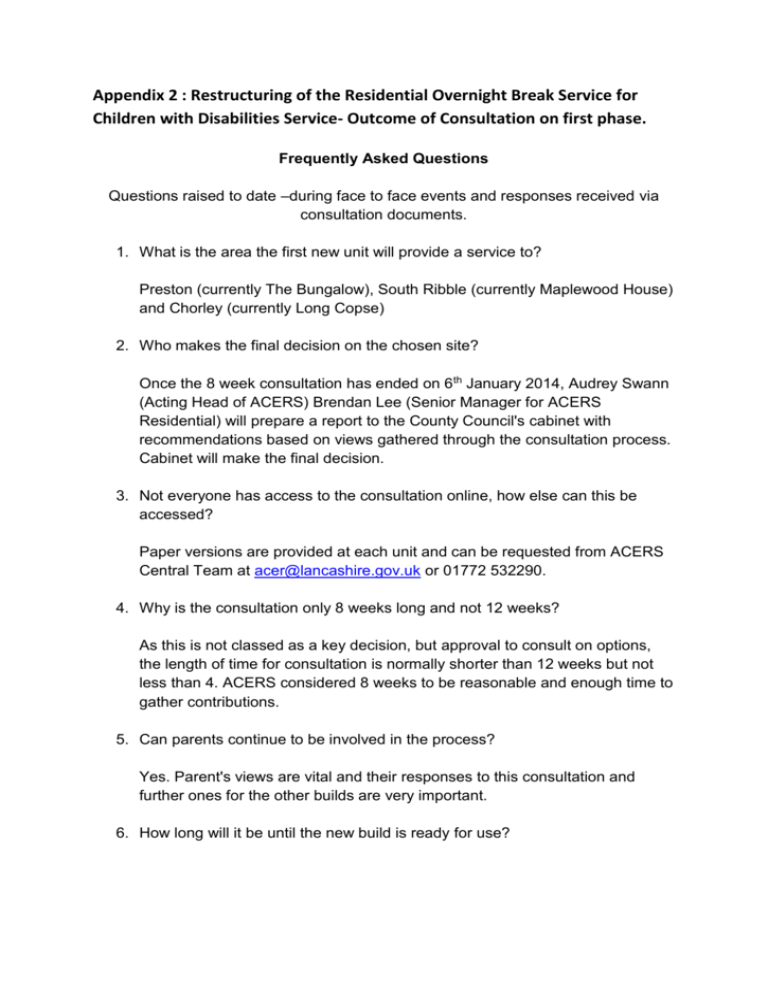
Appendix 2 : Restructuring of the Residential Overnight Break Service for Children with Disabilities Service- Outcome of Consultation on first phase. Frequently Asked Questions Questions raised to date –during face to face events and responses received via consultation documents. 1. What is the area the first new unit will provide a service to? Preston (currently The Bungalow), South Ribble (currently Maplewood House) and Chorley (currently Long Copse) 2. Who makes the final decision on the chosen site? Once the 8 week consultation has ended on 6th January 2014, Audrey Swann (Acting Head of ACERS) Brendan Lee (Senior Manager for ACERS Residential) will prepare a report to the County Council's cabinet with recommendations based on views gathered through the consultation process. Cabinet will make the final decision. 3. Not everyone has access to the consultation online, how else can this be accessed? Paper versions are provided at each unit and can be requested from ACERS Central Team at acer@lancashire.gov.uk or 01772 532290. 4. Why is the consultation only 8 weeks long and not 12 weeks? As this is not classed as a key decision, but approval to consult on options, the length of time for consultation is normally shorter than 12 weeks but not less than 4. ACERS considered 8 weeks to be reasonable and enough time to gather contributions. 5. Can parents continue to be involved in the process? Yes. Parent's views are vital and their responses to this consultation and further ones for the other builds are very important. 6. How long will it be until the new build is ready for use? An estimate of 18 months to 2 years but this will depend on the time taken for environmental inspections and planning permission etc. The aim is to have the building in use as soon as possible. 7. Are 4 new units still going to be built? Nothing different has been said and, as the service providers, ACERS is still working on that basis. The Cabinet report and decision of March 2013 did state that provision will be regularly reviewed. 8. Will re-assessments of care packages need to take place? This would not happen as a result of the new builds. If this occurs it will be due to the new SEN legislation. 9. As there are fewer beds will this affect the young people's current care packages? No. As the new unit will be open for 364 nights the packages of the current young people will be met. 10. How many young people will be in the new build each night? 6 maximum 11. How will the bed reduction impact the young people and families? The new units will be open 364 days a year and will not have closure days like the units have now so the new units will provide increased nights. The new units are aimed to be at 95% to 98% occupancy at all times. Need to balance sustainability, cost effectiveness, need and demand. 12. The demand for short breaks is not necessarily down but diverted to other places. Will the new units be able to cope with demand? The current and future demand for short breaks was looked at as part of the review of the short break strategy for children with disabilities carried out before the consultation in spring 2013. It has been concluded that demand can be met by the new planned provision. 13. What will happen to the staffing levels once the new build is built? A staffing structure is being put together for the new units. Although there will be a 50% reduction in the number of units there will not be a 50% reduction in staff as the new buildings will be open for more nights and the provision will be meeting the needs of all children and those with the most complex needs, so staffing levels have to reflect this. Staff will be interviewed for the posts in the new units. 14. Will there be a provision for emergency beds and if so what will the length be for an emergency bed? This is still to be decided. 15. Will there be a separate unit for emergency placements? No discussions have taken place on how emergency beds should be addressed yet. Discussions are taking place with IDSS (Inclusion and Disability Support Service) who assess the needs for overnight breaks. 16. What age of young people can access the service? The registration of the short breaks is currently being considered. ACERS are considering 0 – 25 year olds as one option. 17. What will happen if the age of young people that the short breaks can provide for changes, will the young people need to move from adults back to CYP? This cannot be answered until the new legislation is in place. 18. Is it possible to have the younger age groups sectioned off? The unit manager will continue to manage the sleeping and living arrangements for all the children and young people to ensure their needs are met. When appropriate it may be possible to have younger children in one area of the building but this will also depend on their other needs. 19. When will health be more involved in short breaks? There have been some positive links made with health services but this need to develop further. The replacements for Statements, Health, Education and Social Plans, does have a greater emphasis on health which help this. 20. Will nursing needs be provided on site as some parents cannot access respite at the moment as their child requires nursing needs? Nursing needs are met in some cases on the site of the short break unit. This issue will be looked at as part of the plans for the new provision. 12. Will the building be eco-friendly? LCC are eco-friendly so the building will be as eco-friendly as possible – it will be well insulated so heat won't leak out of the building, the boilers will be smaller and energy efficient and there is a possibility of solar panels and underground heating. 13. What is the area of the building? Approximately 500m 14. Where is the separating door in the new build? Approximately half way through the length of the building. 15. Will the windows be at an appropriate height for the young people in wheelchairs? This will be raised with the designers. 16. Will the new building be able to cater for play scheme events and other events that include more children? Yes – there is lots of flexibility in the building. 17. Will the young people have access to a kitchen area? Yes when undertaking kitchen activities- this may not be in the working kitchen area for Health and Safety reasons. 18. What if a young person wants to make themselves a drink or a sandwich, if they cannot have access to the kitchen at all times could a preparation area be included in the new build? This will be raised with the design team. 19. Will there be enough lounge space in the new build? There should be plenty of space – lounge/dining area, quiet lounge, conservatory, hobby room/ meeting room. 20. Will there be a hoist where the safe spaces are? Yes 21. Are there enough fire exists in the new build? Yes – all health and safety regulations have been met 22. Can shared bathrooms be shared at the same time? No – the bathrooms cannot be accessed at the same time. All bedrooms have access to at least one bathroom. The Jack and Jill bathrooms can be locked or left open as required. The idea is to provide flexibility to suit all the service users' needs. 23. Can the bed/safe space area be used as a relaxation room? Yes - it is completely up to the service how the facilities are utilised. The aim is to provide flexibility to suit all the service users' needs. 24. Will the local people have to be asked about their views on what is going to be built? Yes 25. Is Rydal House next to the Children's Home in Chorley? Yes 26. Is Lynnhurst a larger site than Rydal House? It is a little bit larger. Rydal House does not have any trees; Lynnhurst does have trees on site. If this site is chosen the trees will not be cut down but used for outdoor activities. 27. Will there be somewhere to grow vegetables? Yes – there is already a large greenhouse on the Lynnhurst site that is being left behind. There would be room to develop this activity at Rydal House but it would not be as extensive. 28. Will there be adequate parking on the Lynnhurst site? Yes – there is one road that goes through the Lynnhurst site. There will be one entrance and one exit through the site. The road in and out of the Lynnhurst site will be made wider so cars can park on the road. There will be lots of space for parking. 29. Would the play equipment outside be fenced off? This depends on the site chosen. Rydal House could have a fenced play area provided like in an ordinary garden. Lynnhurst has much more flexibility due to the space and the trees in the grounds. Both sites would be made completely secure. 30. What will happen with the transport arrangements due to the increased travel time for some young people? As the units are being reduced from 8 to 4 units travel time will be increased however the transport arrangements still need to be looked into in more depth. 31. Will the length of the journey be looked into for each young person? Yes, this will be normal practice. 32. Will the move mean my child may lose contact with friendship groups and key staff? Friendship groups will remain one of the considerations when managing the arrangements for stays for individual children. Part of the planning for the transition and merging of the 3 units will include closer working between staff across the service and preparation for both the staff of the new unit and the children and families to ensure children are familiar with staff and prepared for the changes. 33. Is there a plan to merge the 3 units together through this period as staffing vacancies and reduction in the number of nights required fall? There are no plans to merge the 3 units prior to the new build being in use as long as the existing buildings remain fit for use. As part of the planning for merger there will be increased contact between the staff of the 3 units to contribute to an effective transition and minimise impact on the children and parents in terms of relationships with key staff. .

